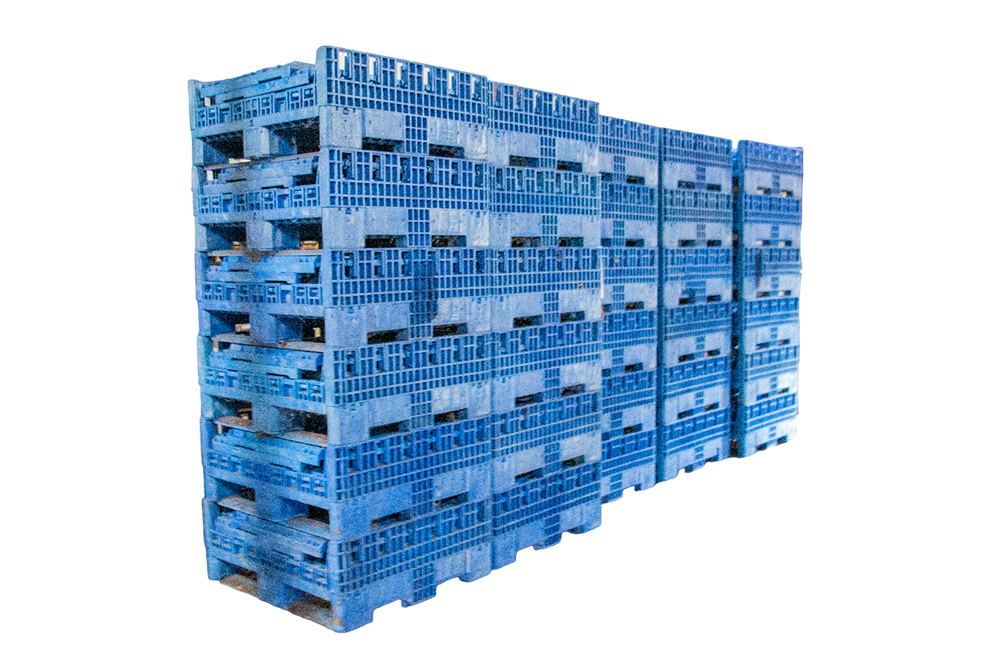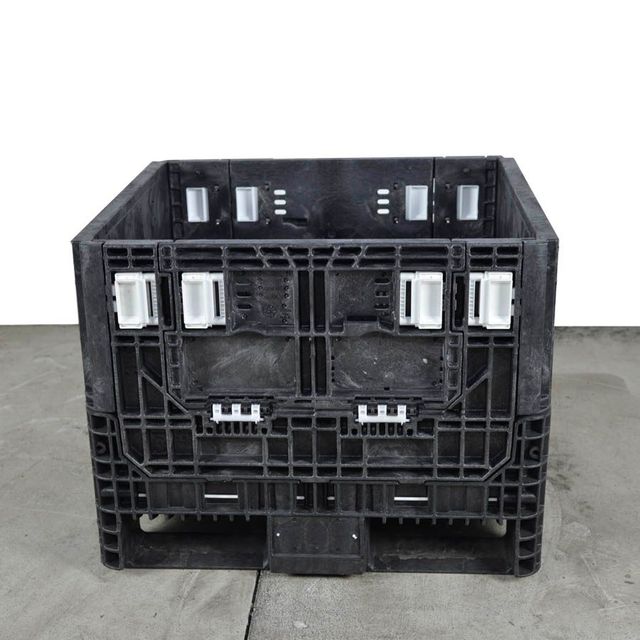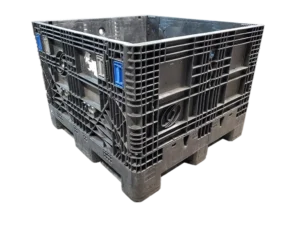Discover how businesses save costs with refurbished bulk containers for everyday use
Why Bulk Containers Are Vital for Sustainable and Affordable Transportation
Mass containers play a vital role in contemporary logistics. They facilitate the reliable motion of big amounts of items, therefore enhancing transportation processes. This technique not only decreases expenses however likewise reduces environmental impact through lower emissions and waste generation. As industries look for more sustainable practices, the adoption of mass containers is coming to be increasingly significant. What ramifications does this shift hold for future logistics and supply chain management?

The Benefits of Using Mass Containers in Logistics
Mass containers change logistics by enhancing effectiveness and sustainability. These containers enable for the transport of huge quantities of items in a solitary journey, noticeably lowering the variety of trips needed. This not just enhances procedures but also minimizes labor costs connected with handling, filling, and dumping. In addition, mass containers are designed to maximize room application within transportation lorries, ensuring that even more products can be delivered all at once.
The standardization of mass containers also simplifies the logistics process. With uniform measurements, they can be quickly piled and saved, causing enhanced storage facility monitoring. Additionally, bulk containers frequently feature sturdy materials that secure components from damages during transit, thus decreasing product loss and boosting overall reliability. Consequently, companies can experience boosted supply chain efficiency, ultimately causing enhanced productivity and client complete satisfaction. This combination of factors makes bulk containers an essential asset in contemporary logistics.
Environmental Effect: Reducing Waste and Carbon Impact
As industries significantly prioritize sustainability, the fostering of bulk containers has arised as an essential strategy for minimizing waste and lowering carbon footprints. These containers minimize making use of product packaging materials, such as boxes and plastic, consequently notably reducing total waste generation. By consolidating deliveries, mass containers enhance transport efficiency, enabling more products to be transferred per journey. This decrease in trips straight correlates with lower greenhouse gas exhausts, adding to a smaller sized carbon footprint.
Moreover, bulk containers can commonly be recycled or recycled, additionally minimizing environmental effect. The sturdiness of these containers warranties they can withstand several transport cycles, minimizing the demand for single-use choices. used collapsible containers. By improving logistics and advertising efficient resource usage, bulk containers not just sustain sustainable practices but likewise encourage sectors to straighten with worldwide ecological objectives. Eventually, their execution shows a commitment to environmental stewardship and accountable resource administration
Expense Cost Savings: Just How Mass Containers Lower Transport Costs
While many companies look for methods to improve their profits, using mass containers provides a substantial chance for reducing transportation expenditures. Mass containers make best use of the quantity of products delivered, enabling companies to ship bigger amounts at when. This effectiveness lowers the variety of trips called for, directly reducing fuel costs and decreasing labor expenses connected with loading and unloading.
Additionally, bulk containers usually feature streamlined designs that optimize space usage within transportation vehicles. This means less voids, causing extra reliable use readily available capability. The sturdiness of mass containers can reduce the danger of item damage during transportation, guaranteeing and lowering losses that more items get here intact.
Enhancing Supply Chain Performance With Bulk Storage Space Solutions
Bulk storage space solutions play an essential duty in improving supply chain efficiency by optimizing stock monitoring. By combining items into less, larger containers, businesses can substantially decrease managing costs connected with regular transfers and handling. This streamlined strategy permits better monitoring and management of supply, inevitably bring about boosted operational performance.
Structured Supply Administration
Reliable inventory management is crucial for optimizing supply chain operations, especially when organizations embrace bulk storage space solutions. These services allow companies to preserve higher stock levels while reducing the frequency of replenishment. By consolidating materials right into mass containers, firms can simplify their supply procedures, minimizing the complexity linked with tracking multiple smaller plans. This strategy promotes accurate inventory counts and improves forecasting precision, permitting even more informed decision-making. In addition, mass storage solutions simplify storage facility company, making it simpler to locate and access items when required. Consequently, organizations can attain a much more efficient supply turnover price, inevitably enhancing total supply chain performance and reducing the chance of stockouts or overstock circumstances.

Minimized Handling Prices
The implementation of mass storage space services not just streamlines stock administration yet also substantially lowers managing prices across the supply chain. By consolidating products into bulk containers, firms decrease the requirement for constant handling and transfer between different storage and transport units. This technique reduces labor prices associated with loading, unloading, and moving smaller sized plans. Furthermore, mass storage decreases the frequency of deliveries, causing lower transportation expenses and lowered gas consumption. Therefore, services can maximize their logistics operations, enabling a much more effective appropriation of sources. Inevitably, minimized managing prices add to boosted overall supply chain efficiency, fostering an atmosphere that supports both sustainability and economic feasibility.

Versatility of Bulk Containers Across Various Industries
Many sectors have unique demands for transportation and storage space, bulk containers have arised as a functional solution that meets a large array of needs. These containers, ranging from big bins to specialized containers, can suit varied products, consisting of fluids, powders, and granules. In the agricultural industry, bulk containers assist in the transportation of plant foods and grains, while the food and drink sector uses them for active ingredients and ended up items. The chemical sector relies upon mass containers for securely transporting dangerous materials, guaranteeing conformity with safety and security regulations. Additionally, building firms gain from mass containers for delivering accumulations and other materials. Their flexibility expands to different settings of transport, including trains, vehicles, and ships, boosting logistical efficiency. This flexibility not only improves operations throughout various fields however also advertises sustainability by reducing product packaging waste and maximizing space in transit. For that reason, bulk containers play an essential function in modern supply chain monitoring.
Future Patterns wholesale Container Usage and Sustainability
The future of mass container use is significantly formed by ingenious materials development that enhances sustainability. Furthermore, automation in logistics guarantees to streamline operations, decreasing waste and boosting efficiency. Welcoming circular economic situation practices will certainly even more reinvent just how bulk containers are created, made use of, and reused, promoting a more lasting transportation landscape.
Cutting-edge Products Growth
As industries increasingly prioritize sustainability, ingenious materials growth wholesale containers becomes a significant consider boosting environmentally friendly transportation options. Suppliers and scientists are checking out eco-friendly plastics, recycled compounds, and lightweight steels to decrease ecological effect. These materials not just reduce waste yet also boost fuel performance by decreasing the general weight of containers. Additionally, improvements in wise products, which can adjust to differing conditions, boost the toughness and performance of mass containers. The combination of these cutting-edge products aligns with circular economic climate principles, promoting reuse and recycling. As the need for lasting practices expands, the growth of such products will certainly play an essential role in shaping the future of bulk container use in logistics and transportation.
Automation in Logistics
Considerable improvements in automation are poised to change logistics and the utilization of bulk containers, boosting sustainability in transportation. Automated systems, consisting of drones click here and independent vehicles, are improving the motion of bulk containers, minimizing the dependence on conventional fuel-powered transport. These innovations maximize routing and packing procedures, improving and minimizing vacant miles fuel effectiveness. Additionally, automated supply monitoring systems boost tracking and tracking of mass containers, ensuring much better resource allotment and reduced waste. The combination of the Net of Points (IoT) permits real-time information analysis, allowing aggressive decision-making that aligns with sustainability goals. As automation remains to advance, it is expected to drive better developments wholesale container use, ultimately sustaining more lasting logistics methods and lowering the environmental effect of transport.
Round Economic Climate Practices
Innovations in automation are establishing the stage for a much more integrated method to circular economic situation techniques in the domain name of mass container usage. As sectors increasingly accept sustainability, mass containers are being developed for long life and reusability. This change not just lessens waste but likewise enhances source performance. Firms are adopting methods such as closed-loop systems, where used containers are gathered, reconditioned, and reintroduced into the supply chain. Additionally, smart technologies track container life cycles, promoting better management and minimizing environmental influence. The cooperation in between manufacturers, logistics suppliers, and end-users is crucial in developing standards for lasting container usage. used collapsible bulk containers. Future fads suggest a growing emphasis on products that are naturally degradable and recyclable, further reinforcing the circular economic situation's principles wholesale transportation

Often Asked Concerns
What Materials Are Bulk Containers Generally Made From?
Bulk containers are generally constructed from sturdy products such as high-density polyethylene, cardboard, aluminum, and steel. These products provide convenience, stamina, and security, making them ideal for moving various products in different markets efficiently.
How Do I Select the Right Size Bulk Container?
Picking the right dimension mass container involves assessing the volume of materials to be transferred, taking into consideration taking care of tools compatibility, and appraising storage area demands. Appropriate dimension warranties efficiency in transport and reduces waste throughout shipment.
Are Mass Containers Reusable or Recyclable?
Mass containers are often multiple-use, made for numerous trips, improving sustainability. Lots of can also be recycled, depending upon the materials made use of. Choosing recyclable options even more decreases and supports environmental goals waste in transport practices.
What Safety Laws Put On Bulk Container Transport?
Safety laws for bulk container transport consist of compliance with the Department of Transport standards, appropriate labeling of dangerous products, architectural honesty evaluations, and adherence to weight limits to guarantee risk-free handling and avoid crashes during transit.
Exactly How Can Organizations Change to Utilizing Bulk Containers Properly?
Businesses can transform to bulk containers by reviewing current logistics, educating staff on handling, buying ideal equipment, maximizing stock management, and working together with suppliers to assure compatibility and performance throughout the supply chain.
As sectors increasingly focus on sustainability, the adoption of mass containers has actually emerged as a vital method for decreasing waste and lowering carbon impacts. By consolidating products into mass containers, business can streamline their stock processes, decreasing the intricacy linked with tracking several smaller plans. As markets significantly focus on sustainability, innovative materials growth in mass containers emerges as a considerable element in enhancing environment-friendly transport solutions. Automated systems, including drones and autonomous vehicles, are streamlining the activity of mass containers, reducing the reliance on conventional fuel-powered transport. In addition, automated supply administration systems improve monitoring and tracking of mass containers, making sure better source allocation and reduced waste.